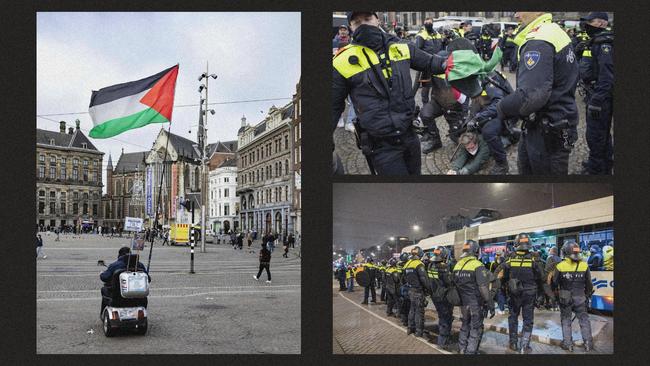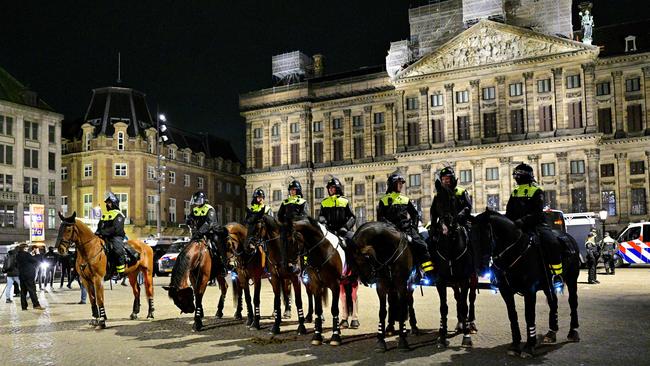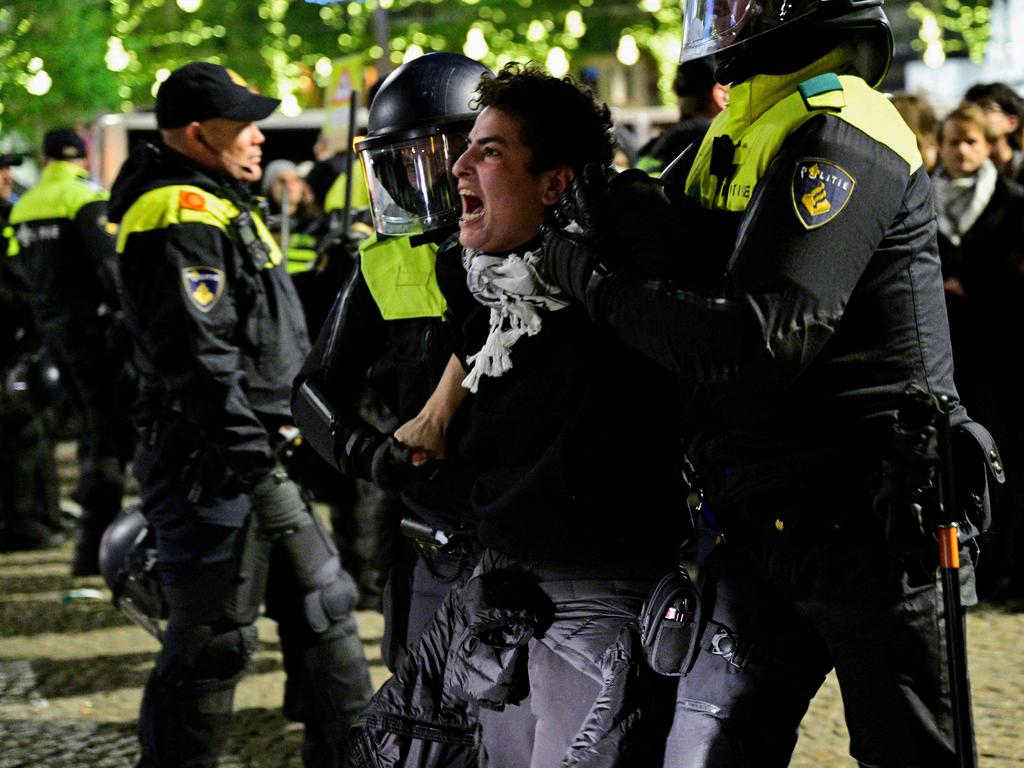
The attacks, which followed a soccer game between a Dutch and an Israeli team, appear to have been premeditated and well-organised. Nor were they an isolated incident.
Rather, they reflect a longer-term build-up in violent anti-Semitism. Immediately before October 7, a report by the European Union’s Agency for Fundamental Rights found that an unprecedented 25 per cent of Dutch Jews feared for their safety. And since then the number of anti-Semitic incidents has trebled.
But the latest outbreak is more than just another horrifying indicator of growing anti-Semitism. It also signals a deep, now almost certainly fatal, crisis in Dutch multiculturalism.
At least originally, the decision to provide the country’s Muslim immigrants with their own schools, housing and community services was taken on purely pragmatic grounds. The assumption was that the Turks and Moroccans who, as of the late 1950s, had been brought to the Netherlands to fill gaping labour shortages would only be required for a short while. It therefore seemed sensible to ensure they retained their culture of origin, as that, it was thought, made it more likely they would be happy to leave.
However, by the early 1970s it had become clear the “guest workers” had no intention of going home. At the same time, elite attitudes had changed dramatically. Accommodating Islamic separatism was no longer seen as a pragmatic necessity; it was considered the morally right thing to do. Widely publicised revelations of Dutch complicity in the Holocaust underscored the point: to oppose Islamic separatism was worse than wrong – it demonstrated a lack of humanity.
Any possible costs or risks were consequently dismissed out of hand, all the more so as Dutch academia had embraced the “contact hypothesis” formulated by social psychologist Gordon Allport in his classic The Nature of Prejudice (1954). Giving that hypothesis an optimistic (and entirely unwarranted) interpretation, advisers assured the government that ongoing contact between Muslim immigrants and their Dutch hosts would ultimately erase any ethnic tensions.
All that induced a pioneering shift to what was becoming known as multiculturalism. Thanks to generous public support, it did not take long for the Netherlands to boast the highest number of mosques and Muslim schools per capita in Western Europe, along with taxpayer-funded imam training, Muslim chaplains in the army, hospitals and prisons, and free airtime for Islamic programs on public TV channels. Moreover, provisions were introduced ensuring Muslim community leaders participated in a wide range of public policy decisions.
By 2000 an Institutional Accommodation Index, which measures 15 Western European countries’ response to seven key Islamic claims, placed the Netherlands at the top of its rankings. And the Netherlands’ “accommodation” score rose even further between 2000 and 2010, as additional measures were adopted to empower Muslim communities.
But if the policies empowered anyone, it was the best organised and most determined Muslim groups, ranging from the Erdogan-aligned Millî Görü, which is an arm of the Muslim Brotherhood that operates in Australia as a registered charity, to the Moroccan offshoots of the Salafis.
As well as seeking to segregate Muslims from Western “corruption”, including by strictly enforcing rules that limit opportunities for women and girls, those groups have a long history of vicious anti-Semitism. Through their government-sanctioned control over community institutions, they made Islamic schools and mosques into breeding grounds for Judeophobia: in the Netherlands, Muslims are five times more likely than Christians to believe Jews can never be trusted.

And they also transformed heavily Muslim neighbourhoods into incubators of violence, brutally exemplified by the death threats against Ayaan Hirsi Ali and the assassination (and ritual beheading) of her collaborator, Theo van Gogh.
The results are apparent in EU surveys of serious anti-Semitic incidents. Perhaps because of its sensitivity, the relevant series has been discontinued. But in 2018 it found that in the Netherlands, a clear majority of the identifiable perpetrators were Muslim, with almost all the others being their allies on the left. In none of those series, or their counterparts on the Muslim experience, were there any reports of assaults on Muslims by Jews.
In short, the policy put in place to achieve conciliation had created and entrenched catastrophic social divisions, endangering vulnerable Dutch citizens.
Allport would not have been surprised. In setting out the contact hypothesis, he had warned that intergroup contact only induced greater toleration under “optimal” conditions. Those included the absence of institutionalised separation between the groups, as separation “tends to increase mutual suspicion, distrust and hostility”. Additionally, contact needed to “give rise to a sense of common identity, shared by members of both groups” – and crucially, that sense of common identity had to be “supported by laws, institutions and norms”.
The intellectual forefathers of liberalism would have heartily endorsed Allport’s warnings. From Michel de Montaigne and John Locke to David Hume and Adam Smith, they never considered toleration a universal human attribute, much less claimed it would be self-enforcing.
Acutely aware of the havoc extremist sects wreaked in the lead-up to the wars of religion, they assumed the “civil magistrate” would suppress whoever threatened what the Renaissance humanists had called “il vivere civile” – a life in peace and security. They fully understood that when the authorities refuse to intervene, toleration can rapidly degenerate into the policy Martin Hollis, a leading British political philosopher, caustically described as “liberalism for the liberals, cannibalism for the cannibals”: which is all well and good, until the cannibals start throwing the liberals into the pot.
But Dutch multiculturalism took none of those dangers into account. Far from suppressing Islamic separatists, it showered them with power, funding and authority, hoping that would transform them into “moderates”. Unlike France, which rigorously monitors Islamic schools and closes them if they are inculcating anti-Semitism (as several leading schools surreptitiously were), the Netherlands allowed generations of young Muslims to be taught hatred at the public expense.
And instead of impartially enforcing the law, the police and public prosecutors, who were petrified of being accused of Islamophobia, acted more vigorously against alleged insults to Islam than against actual attacks on Jews. That the Dutch police, who seemed reluctant to protect the victims of the football riot, legitimated anti-Semitism by excusing police officers from guarding Jewish sites if they found doing so “offensive”, only made things worse.
Now, after decades of policy failure, the Netherlands is reaping the whirlwind. Faced with a fierce public reaction that poses grave risks of its own, the new Dutch government is drawing that failure’s bitter lessons. It is up to our government to show it has the intelligence and, even more importantly, the moral courage to do so too.






“Barbarians on scooters are riding through our capital city hunting Israelis and Jews,” David van Weel, the Dutch Minister of Justice and Security, wrote on X late last week as a violent, largely Muslim, mob rampaged through Amsterdam’s streets.